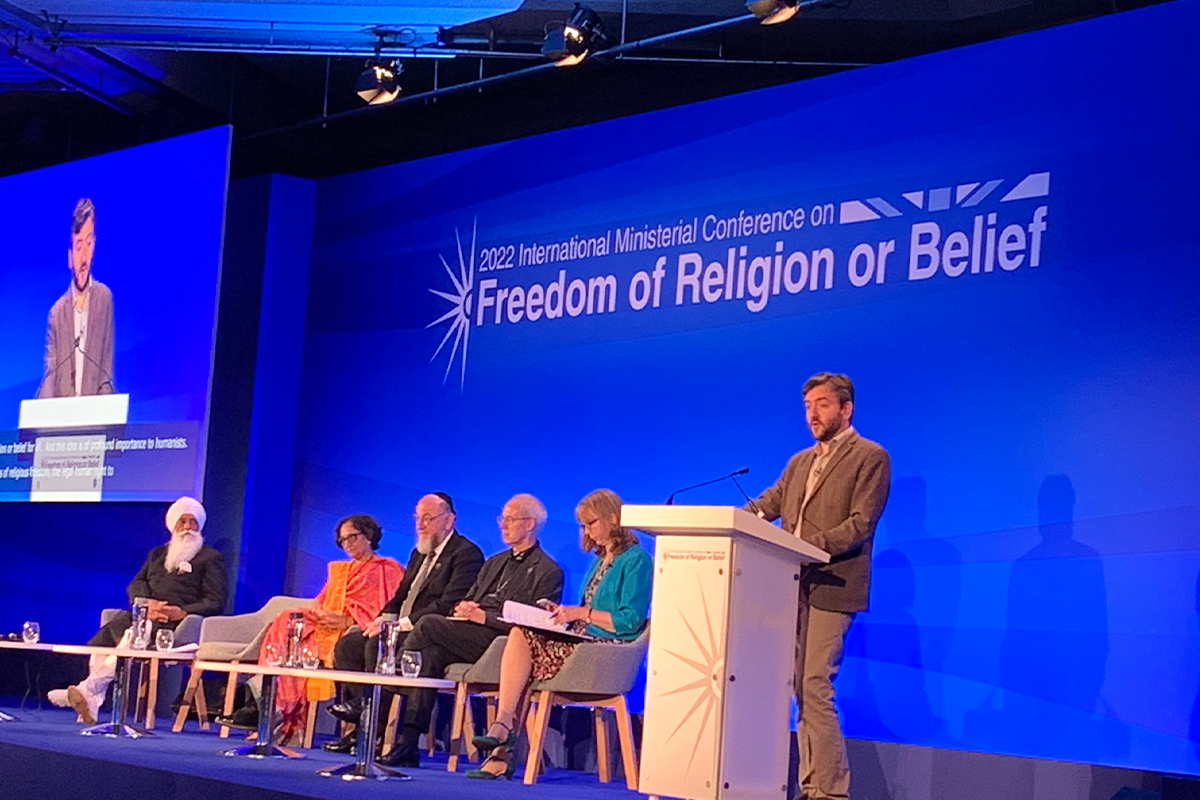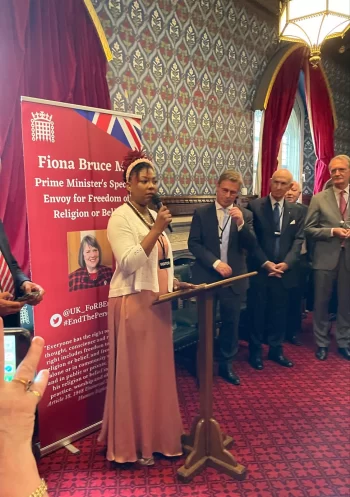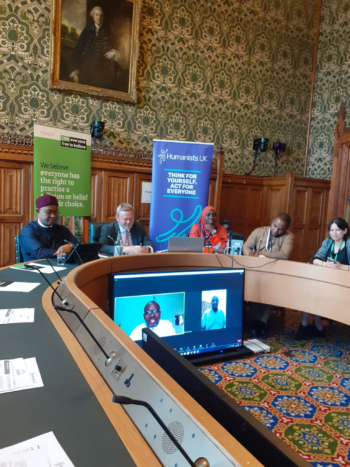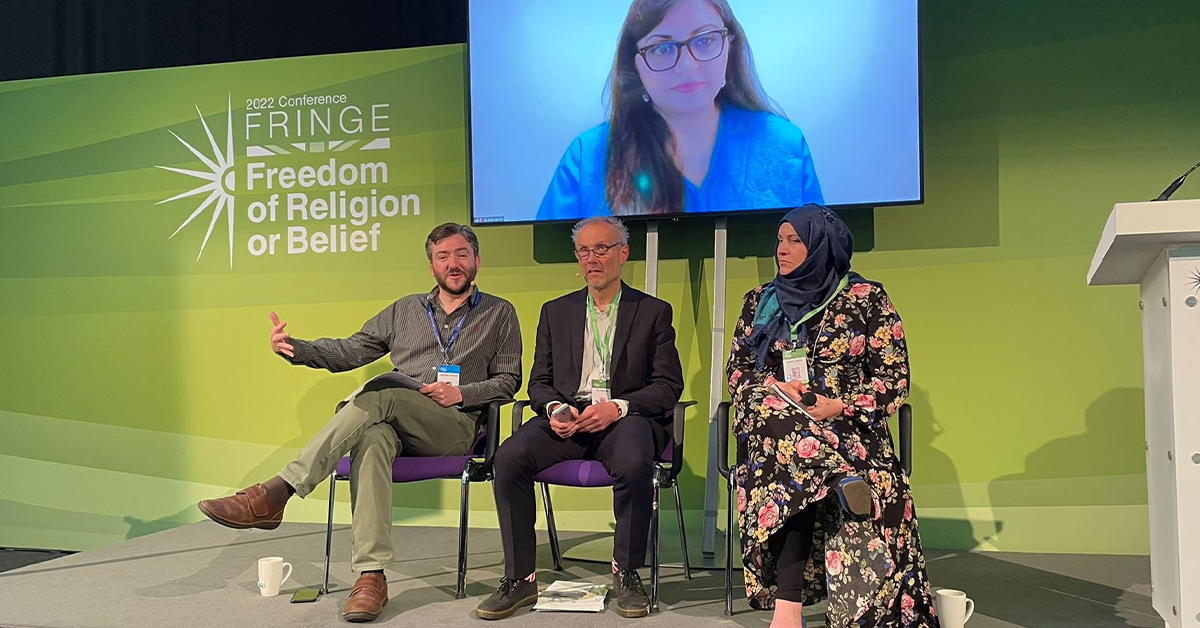
This week, humanists from all around the world gathered in London for the annual International Ministerial on Freedom of Religion or Belief (FoRB). The event is hosted by a different Government each year. It provided a platform to speak on a range of issues of concern to humanists across the world, emphasising that the non-religious are also protected by the right to freedom of religion or belief.
Humanists addressed the delegation of international governments, parliamentarians, faith and belief representatives, and civil society by joining four panels in the main programme of the Ministerial. The first was the opening plenary, ‘FoRB: A right for everyone, everywhere’, at which Humanists UK’s Chief Executive Andrew Copson – in his capacity as President of Humanists International – spoke alongside the Foreign Secretary, Archbishop of Canterbury, Chief Rabbi, and global Muslim, Hindu, and Sikh leaders. He rejected so-called ‘religious freedom’ in favour of ‘freedom of religion or belief’. He highlighted that the latter includes the non-religious. And he will point out that it must include ‘those with whose choices, values, and beliefs we may be in profound disagreement’.
Andrew also spoke on a panel on ‘Beyond the constitution: building blocks and incentives for effective protection’. Roslyn Mould of the Humanist Association of Ghana spoke on a panel on ‘Civil society as a driver for change’, while Young Humanists UK’s Alavari Jeevathol spoke on ‘Engaging the next generation’.
Humanists UK also organised fringe events in the main conference venue on ‘Learning FoRB: the role of schools and education’, ‘Religion and the state: secularism and FoRB’, and Measuring freedom: quantifying progress and warning signs for FoRB around the world’. And it collaborated on a further two fringe events held in the House of Commons. ‘Free to Believe… or Not: End Criminalisation of Apostasy and Blasphemy’ was co-organised by the Jubilee Campaign and Set My People Free. ‘Freedom of Religion or Belief in Nigeria’, chaired by All-Party Parliamentary Humanist Group member and Shadow Foreign Minister Lord Collins of Highbury, was co-organised by CSW and Tearfund.
Humanists UK also arranged speakers on a further three panels on ‘Preventing Violence, Promoting Freedom of Belief’, ‘The impact of COVID-19 on International Freedom of Religion or Belief, and what can be learned from international responses’, and ‘Gendered FoRB Violations’. Humanists UK staff also engaged with delegates visiting its exhibition stand to highlight the importance of including humanists at risk when considering violations of the right to freedom of religion and belief.

Speaking on why gender and youth matter when considering freedom of religion and belief, Roslyn Mould, a founding member of Humanist Association of Ghana and a Humanists International board member, said:
‘A lot of our work has been on promoting critical thinking across the continent, supporting humanists, creating awareness that there are Africans who are also non-religious and we can live side-by-side with people of religious backgrounds. Most of our work has also been about the promotion of freedom of religion or belief. And we know that also includes freedom from religion, as well the freedom of religious minorities.
‘Most of our work has to do with the misuse of FoRB, the violations of human rights when it comes to freedom of religion or belief… We have certain people from religious groups using their freedom to infringe on other people’s rights. And it seems that when it comes to African issues, they have to do with the oppression of women in one way or the other. Women and girls.’
She particularly talked about the Humanist Association of Ghana’s groundbreaking work rescuing women accused of witchcraft, successfully rehabilitating some into their communities, and to challenge the current anti-LGBT Bill before the Ghanaian Parliament.
To reinforce that freedom of religion or belief is not about religion, but about people to hold religious or non-religious beliefs, Young Humanists UK’s Alavari Jeevathol highlighted:
‘Young people are forming their identities, exploring their sexuality, exploring their gender, exploring their relationship to their place in society. At that critical age, if FoRB protections aren’t there to support them, they can be lost. They can be lost to the dark corners of the internet. They can be lost in the stereotypical ways we consider, sometimes unfairly, young people to be lost – with their head in the clouds, in video games or the internet, or lost to the real world.
‘I’d like to urge policy makers to join Humanists UK in promoting FoRB protections for the non-religions. In the UK, the latest surveys show that 70 percent of 18- to 24 year olds have no daily relevance to religion whatsoever. If we ignore that, we ignore the future.’

Dr Leo Igwe, founder of the Humanist Association of Nigeria and current Humanists International Board member, opened his address to the panel on ‘Freedom of Religion or Nigeria’ by stating that:
‘If Nigerian parliamentarians were to organise an event on freedom of religion or belief, religious non-believers would not be invited or consulted. This is not because the non-religious community does not exist. In Nigeria, the non-religious are treated as social outcasts. In some parts of the country, they consider them criminals who should be locked up, jailed, or executed for their non-belief in god. People of no faith would not participate in the deliberation and exploration of this fundamental right because persons with no religion are considered undeserving of equal humanity and human rights.’
Dr Igwe called for unity and collaboration:
‘Let us work together to free the rights of humanists from religious hostage, and from the grip of theocratic jailers and their allies. Let us work together to realise freedom of religion or belief for every, and all Nigerians.’
Gulalai Ismail, founder of Pakistan’s Aware Girls and global ambassador of Humanists International, concluded one of her speeches with a similar call:
‘While humanists continue to organise and resist in the most oppressive countries, a comprehensive protection and support system is lacking. We need to build international solidarity with those who are risking their lives for humanist values and those who are persecuted for being a religious minority. Those who stand for the freedom of religion or belief. Such solidarity would require not only building mechanisms to lobby state authorities, but also to extend legal and financial support to the families persecuted for blasphemy.
‘ There is an immediate and urgent need for building a truly international movement for ending the criminalisation of blasphemy and apostasy and for the promotion of freedom of thought and expression. And we need a movement based on the partnership of countries of both the global north and the global south.’
Humanists UK’s fringes also featured many non-humanist speakers. One was Commissioner Fred Davie of the U.S Commission on the International Religious Freedom (USCIRF), who spoke about the many countries that are constitutionally secular but that are serious FoRB violators. He spoke in support of secularism as an essential part of FoRB, but explored the universality of the family of human rights of which FoRB is one, and how several rights together must be guaranteed before FoRB will be upheld.

Over the coming months and years, Humanists UK will expand its work to protect humanists at risk around the globe. It wants to make sure the UK Government does everything it can to secure freedom to be non-religious for everyone, everywhere.
Notes:
For further comment or information, media should contact Humanists UK Director of Public Affairs and Policy Richy Thompson at press@humanists.uk or phone 020 7324 3072 or 020 3675 0959.
Read President of Humanists International Andrew Copson’s address at the opening plenary.
Watch Andrew Copson’s summary of the Ministerial.
Find out more about the our participation at the Ministerial.
Read about Humanist UK’s international campaigns.
Find out more about Humanists International.
Humanists UK is the national charity working on behalf of non-religious people. Powered by 100,000 members and supporters, we advance free thinking and promote humanism to create a tolerant society where rational thinking and kindness prevail. We provide ceremonies, pastoral care, education, and support services benefitting over a million people every year and our campaigns advance humanist thinking on ethical issues, human rights, and equal treatment for all.
